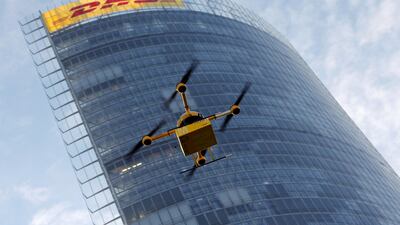A couple of weeks ago, Facebook revealed that two of its artificial intelligence (AI) machines had developed their own language to communicate in a more efficient fashion. The response was wide-scale scaremongering from pundits who lamented the evolution of computers.
It might be a while before robots take over, but a recent study from Oxford University suggests that robots and AI will replace most human tasks by as early as 2051 and all human jobs by 2136.
Technology has already progressed enough to give us driverless cars, robot police and autonomous delivery drones, but the true impact will go beyond making large swaths of the population redundant and drastically alter our society as we know it – from education and health care, to the criminal justice system.
"Traditionally, to get a computer to do something, you had to write code and algorithms, but AI is different...the algorithm works independently," said Duncan Angove, president of software company Infor at a recent conference in New York. "No human programming is used, the software automatically learns from the data, it accumulates the knowledge and keeps getting smarter."
Infor has launched its own AI offering called Coleman, after Nasa physicist and mathematician Katherine Coleman Johnson, whose calculations helped man reach the moon, targeting the enterprise sector.
"What if you could make the best decision every time, do the work of two people and allow you to spend more time with clients, guests or patients or citizens?" says Mr Angove.
A world in which mistakes are never made is difficult to fathom and seems to go against the very nature of humans. But what if AI at least enabled better decision-making? That is the allure for businesses around the world.
AI can mine data from the internet as well as the sort of data most people would think pointless or irrelevant like the number of times you unlock your phone on a daily basis, or open the fridge door or refill your car with petrol. Every aspect of our lives can provide insight into our choices and collating and analysing this data provides better opportunities for targeted advertising.
––––––––––––––––––
Read more:
Dubai's Aramex harnesses the power of AI
Rogue Chinese robots challenge government and artificial intelligence
––––––––––––––––––
Roomba, the US manufacturer of the iRobot vacuum cleaner, came under fire for its plans to sell data on floor plans in customers' homes to Google, Amazon and Apple. The data maps out the distance between items of furniture and overall room size, so the bigger an apartment in a city like New York or Hong Kong, the wealthier the customer is likely to be, meaning they can be targeted for adverts from luxury brands.
While this worries privacy advocates, it unleashes opportunities for businesses, according to proponents of AI and robotics, which in their opinion will bring positive effects that outweigh the negative.
"These positive effects include direct job creation, contribution to GDP growth, creation of new services and industries, workforce transformation and business innovation," says Louay Dahmash, territory director of the Middle East and Turkey at engineering software firm Autodesk. "The use of robotics, virtualisation and AI has the potential to transform the marketplace, improve living standards and more robust international trade, all the while revolutionising virtually every industry."
According to software provider Citrix, 40 per cent of all digital transformations will be driven by AI by 2019, 75 per cent of apps will include some form of AI by next year and the AI market advantage of those who embrace AI will exceed US$1.2 trillion by 2020.
As AI makes both physical and software robots more intelligent, technology will be assigned with more tasks and roles in business.
The GCC in particular has embraced technology as a key driver of economic visions. Many processes have already been automated, from e-gates at the airport to employee check-in systems at the workplace.
Complete digitisation or automation will begin with eliminating paperwork and replacing it with digital processes before AI is introduced, according to Ashraf AlQudah, the chief executive and founding partner of Jordanian company TjDeeD, which specialises in IT and automating services.
TjDeeD recently worked with Abu Dhabi Police and the Ministry of Labour to virtualise some of their processes and the company is now developing chatbot software, a type of robot that interacts with the user, completing tasks and bringing up information when requested.
"In five to 10 years from now, the chatbot and AI will replace a lot of things. I'm expecting services, including government services will be available 24 hours a day, seven days a week," says Mr AlQudah. "Some jobs, you won't see people working, some you will see people making decisions and robots bringing analysis so together they will form a team."
Working in partnership is the likely reality in the near future. Dubai-based ZenHR's technology automates various aspects of human resources management and claims to increase efficiency by 33 per cent.
"Whatever you automate is essentially whatever you want to do quicker," says Youssef Shamoun, chief executive of ZenHR. "You cannot automate the whole process because there needs to be a human element."
How imperative this human element will be in the next few decades remains to be seen, but one thing is certain, these new technologies will continue to disrupt current business models and companies and governments will have to adapt to survive.
"Vested stakeholders should actively look at developing sustainable models to upskill and generate new forms of work streams of the future," says Ibrahim Nasser, chief human capital and administration officer at telecoms operator du.
"The eco-system of the UAE and across the region still has a long way to go and is constantly developing … with this set, active deployment of such new technologies can happen on a vast scale."

